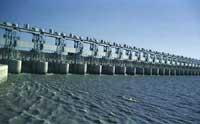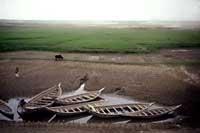I. Antiquity: "the problem is management, not water".

The United Nations has noted in its global water resources report that the water crisis will worsen greatly in the coming years. Population and pollution will increase and, if current inertia is followed, water resources will be reduced. Climate change will also worsen. According to the United Nations, the amount of water per person will be reduced by a third in the next twenty years.
Faced with these dark announcements, Iñaki Antiguedad is clear that the problem is not water, but water management. Iñaki Antiguedad is professor of Hydrogeology at the UPV.
Iñaki, III World of Water. Will the forum serve to warn of the water crisis?
I am not very optimistic, because there is not much reason to be optimistic. Bear in mind that this is the third forum and that other meetings have discussed water and water problems at the Rio summit in Johannesburg. In all of them the same questions have been repeated, but nevertheless they have been given a very poor solution. It has been said what the solutions are, but it is very difficult to carry them out.

On the other hand, there is talk of the water crisis, but I am convinced that in the crisis there is not water, but water use. This leads to many other things. In fact, current development and resource management are truly unacceptable. When talking about the water crisis, consciousness is somehow justified, but the crisis is not water, but water managers around the world. Today's society is not on the path of sustainability, on the contrary, and it is impossible to solve the water problem. The fourth and fifth forum will also be held, in which old water problems will be replenished. That's why I'm not very optimistic.
What topics will be discussed mainly in this forum? What opinion flows exist?
Among those attending this meeting there is a big spin. Some consider that water is a commodity and therefore water management must be analyzed from the market point of view; they speak of the water market. Other non-governmental organizations, for example, claim that water is a right and that we all have to have access to clean water. It is difficult to know what the winning thesis will be in the forum, that is, what will be collected later in the report.

However, this problem is not unique to water. UNESCO also mentions energy in the report and that struggle is no stranger to us. How to manage energy? Does it have to be a public service, in the hands of all or the multinationals that supposedly bet on sustainable development? Water is the subject of debate. Water has become a business and some want to increase this trend. But against this trend we must rise, either a developed or underdeveloped country.
In relation to this conflict, the World Bank has stated that there is not enough money to make the necessary investments to bring water to developing countries. Consequently, it proposes to increase the price of water. Can you get through this path?
Water is not like any other resource. Gas, like water, is distributed very irregularly in the world, but is transported from one side to the other without problems. With water it is not possible. This means, at least if it is sustainable, that the socio-economic development of each place must conform to the possibilities offered by the territory.
Unfortunately, today it is not so because there is interest in developing some places in a different way. I don't mean Africa or Asia, I mean Europe or Spain. In what seems like a hydrological plan, for example, water is said to be lacking in the Levante area. But in Levante there is no lack of water, the urbanization and the golf course are located on the top of the Levante. That is why I say that this is not a water crisis. It is a crisis of interest around water. We must reflect on what it delimits. That is, are we willing to develop depending on the resources offered by the territory or do we want to develop it according to the market? The first is sustainable, the second is unsustainable.
In this case, the United Nations has several challenges. Have these challenges been raised based on the concept of sustainable development you mention?

Yes. The United Nations launches a list of 11 challenges related to well-being and water. They have clearly stated, at least in the text, that the water problem will not be solved if there are no ways to solve poverty. They have joined water and energy in a very simple way. And they say that every individual living in the world has to be guaranteed energy, healthcare, food, education and water because they are rights. But many other things are in the background.
For example, in Africa and many parts of Asia there is hunger even though 90% or more of its water is used in agriculture. How is it possible? Agriculture has also become a market, monoculture has spread enormously, but not to feed the natives, but to feed Europe and North America. This agricultural model is directly related to water. Although not mentioned, the sovereignty raised by the agrarian union is closely related to water. In fact, if traditional crops were planted, more water would be available for use by the local population. Therefore, the lack of culture associated with water is not exclusive to Africa or Asia.
He mentioned agriculture. According to FAO, water consumption in agriculture is 70%, but in irrigation water is not managed properly. According to FAO, population growth would not be a problem if irrigation systems were managed more rigorously.

The issue of irrigation systems is true and not new. In agriculture a lot of water is used, in some areas more than 70%, but more is tracked than is used. If you water more demanding, people would have more water available, but don't think that will be the panacea of the world. There are areas where there has always been a healthy and rich dry farming, but in the last 10-20 years irrigation plantations have been launched. This has happened in the Levante area. And because irrigation needs more water, it is easier to transfer it in the name of agriculture and then use it to promote urbanization or projects as unsustainable as Terra Mítica.
The water council has stated that transgenic plants that consume less water can help solve the water crisis. A transgenic rice that can grow with little water has been mentioned. What do you think?
GMOs are in fashion. Transgenics are said to save people who are starving. To assess this type of affirmation, we must consider who and where they are currently fighting against the most ferocious GMOs. In Africa, Asia and South America. So?

Related to water I have a good example of this type. In Bangladesh, tens of thousands of people die each year during cyclones due to flooding. With this excuse, the World Bank will put money to build dams and prevent flooding. But the locals don't want that rush. At an international meeting representatives of Bangladeshi deltas farmers said they preferred to continue as usual. Even though the floods killed their relatives, paid them land and secured a meal for another year. If dams were built, they might starve and prefer to face the known danger, the floods.
The same goes for GMOs. These kinds of issues must be analyzed from a broad perspective, since nature is not a market.
And in Euskal Herria? What is the situation in Euskal Herria? In recent years a great effort has been made in cleaning the streams, has it yielded results?

It is true that the streams have been cleaned, the water is cleaner, but I do not believe at all that, as the counselor has said, we have done the duties. Streams are now in worse physical condition. Discussions about water management are not issues of the distant third world.
More information: III World of Water. Foro 2003, año del agua Global water crisis (en la web de la revista Nature) Water or water culture, what less?
Buletina
Bidali zure helbide elektronikoa eta jaso asteroko buletina zure sarrera-ontzian











